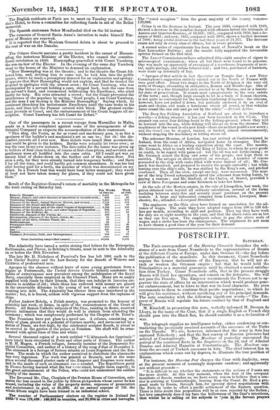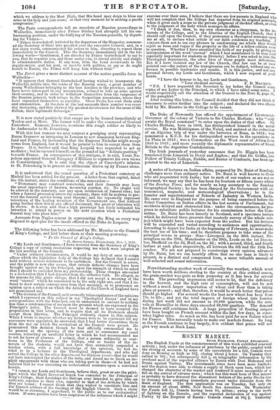POSTSCRIPT.
SATURDAY.
M. Kisseleff, in presenting this note, verbally informed M. Dronyn de Lhuys, in the name of the Czar, that if a single English or French ship should pass into the Black Sea, he should consider it as a declaration of war.
The telegraph supplies no intelligence today, either confirming or con- tradicting the previously received accounts of the successes of the Turks on the Danube. We are, however, informed that the army in Asia has captured Tcherkedy ; and that the first convoy of Russian prisoners had arrived at Constantinople. The Noniteur of yesterday announced the arrival of the combined fleets in the Bosphorus on the 2d, and of Admiral Dundas and Admiral Hamelin at Constantinople. The .11fonateur con- firms the account of Turkish successes in Asia. The chief interest lies in explanations which come out by degrees, to illustrate the true position of Russia.
For instance, the Morning Post charges the Czar with duplicity, even at the present moment of seemingly desperate candour; and apparently not without grounds-
" It is difficult to say whether the statements or the actions of Fusels are the more double. At this very moment, when the text of the arrogant manifesto of Russia reaches us, we have every reason to believe that a cou- rier is arriving at Constantinople, bearing from the Count Be Buol a pro- posal made by Russia, through him, for opening direct negotiations with the Porte in order to effect a pacific settlement of the Eastern question. There is little doubt this proposition will be at once rejected by the Sultan ; but how completely does it lay bare the hollowness of the Czar's intentions, that whilst he is calling on his subjects to 'join lort ,the fervent prayers
which we address to the Most High, that His hand may deign to bless our i arms in the holy and just cause,' at that very moment he is seeking a pacific compromise."
The Paris correspondents tell an anecdote of Russian proceedings in Wallachia, immediately after Prince Stirbey had abruptly left his em- barrassing position, under the bullying of the Russian generals, by depart- ing for Vienna-
" Prince Gortschakoff, irritated by the departure of the Hospodar, summon- ed the Secretary of State who presided over the executive Council, and, in a few sharp words, communicated his orders to him, directing to repeat them immediately to the Council. This the Secretary immediately did in the fol- lowing words= Gentlemen, I am directed by Prince Gortschakoff to say to you, that he requires you, and those under you, to attend strictly and simply to administrative duties. If any man, from the band downwards to the deputy-major, quit his post, or meddle with politics, or say or do aught hostile to Russia, the Prince will hang him without trial."
The Petrie gives a more distinct account of the native guerilla force in Wallachia-
" It appears that General Gortschakoff having wished to incorporate the Wallachia militia into the ranks of the Russian army, a great number of young Wallachians belonging to the best families in the province, and who have never taken part in any insurrection, refused to take up arms against their country, and in order to withdraw themselves from the vengeance of the Russian general, took refuge in the Carpathian mountains, where they have organized themselves as guerillas. Omer Pacha has sent them arms and ammunition. At the date of the last accounts their number was every day increasing, and they showed the greatest devotedness for the cause of the Sultan, their legitimate Sovereign."
It is now stated positively that camps are to be formed immediately at Toulon and at Metz. The former will be wider the command of General Canrobert. Rumour, however, mentions this rough soldier as likely to be Ambassador to St. Petersburg.
With this last rumour we may connect a gossiping story representing Baron Brunnow as intriguing in London to SOW dissension between Eng- land and France, by insinuating that the Emperor Nicholas might accept terms from England, but it would be painful to him to accept them from France. It is further said that King Leopold was requested to act as mediator ; but he excused himself, on the ground of his "delicate position" towards France. In consequence of this intrigue, it is said, Louis Na- poleon appointed General Baraguay d'Hilliers to represent his own views at Constantinople. It is said that the object of Canroberrs mission to St. Petersburg is to present an ultimatum drawn up ,by France alone.



































 Previous page
Previous page